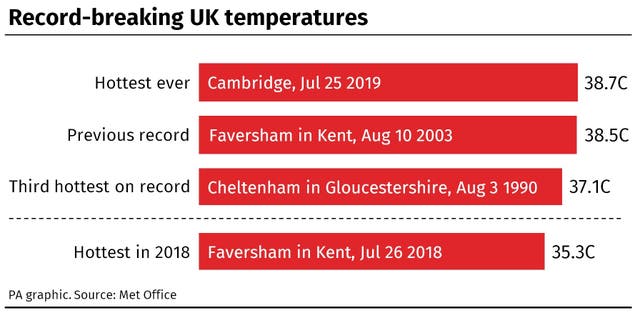The record-breaking July heatwave in central and western Europe would have been up to 3C (5.5F) cooler if the climate was not changing, new research has found.
There is “extremely little chance” that some of the high temperatures would have been reached if humans had not had an impact on the climate, the World Weather Attribution report adds.
It said heatwave temperatures recorded in France and the Netherlands in the last week of July, which exceeded 40C, would only occur around once every 1,000 years without climate change.
And it said hot spells like the one recorded in the UK and Germany would only occur around every 50 to 100 years if global warming was not taking place.

Breaking Records
Every heatwave in Europe since 2003 was found to have been made “much more likely and more intense due to human-induced climate change”, the report adds.
On July 25, a record-breaking temperature of 38.7C (101.66F) was registered at Cambridge University Botanic Garden, exceeding the previous UK high of 38.5C (101.3F) set in Faversham, Kent, in August 2003.
The UK joined Belgium, Germany and the Netherlands in breaking national records as exceptionally high temperatures gripped large parts of central and western Europe.
A World Meteorological Organisations report published on Thursday said the July heatwave was “accompanied by dramatic ice melt in Greenland, in the Arctic and on European glaciers”.

The latest report said some of the temperatures broken during the recent heatwave had stood since the 1950s “with some stations setting new records that have continuously been monitoring the weather for more than 200 years”, including Oxford.
“Potentially lethal”
“While the new records made headlines, such extreme temperatures are dangerous, in particular when prolonged over several days and nights,” the authors said, adding that heatwaves can “increase mortality” and “pose a substantial risk to human health and are potentially lethal”.
The danger to life posed by heatwaves is aggravated by an ageing population and more people living in cities where temperatures can be higher, according to the researchers.
The elderly, who are living alone in increasing numbers, are among the most vulnerable to extreme warm weather.

“Heatwaves are known to increase mortality, especially among those with existing respiratory illnesses and cardio-vascular disease,” the report states.
Urbanisation makes heatwaves more severe as less space is taken up by forests and greenery but it also means more people are exposed to the higher temperatures typically experienced in cities, according to Oxford University climate researcher Dr Friederike Otto, who worked on the paper.
The June and July heatwaves were caused in part by a low-pressure weather system developing offshore from the Iberian peninsula and bringing hot air from north-west Africa to Europe, the report states.

